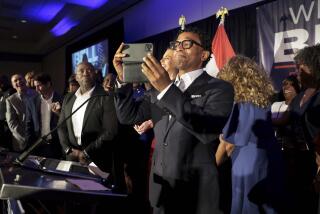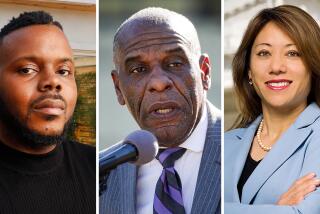Louisiana Candidate Wins Ground Even if He Loses Bid
- Share via
BATON ROUGE, La. — If history were his guide, Cleo Fields wouldn’t be here right now, not in the guest of honor’s seat at a Rotary Club luncheon, and certainly not as a candidate for governor of Louisiana.
Physically, he’s all wrong for the part, nothing like the flamboyant swashbucklers and corpulent good ol’ boys who have earned this state its piquant political reputation. At 32, with large tortoise-shell glasses dwarfing his youthful face, Fields appears painfully thin and ascetic, shunning lunch as his hosts wolf down a buffet of gumbo, sweet potatoes and fried catfish.
Ideologically, the two-term congressman also seems out of step, pushing a liberal Democratic agenda at a time when the Deep South is becoming increasingly conservative and Republican. His pro-gun, anti-abortion opponent, state Sen. Mike Foster, defected to the GOP just a few months ago and is considered the heavy favorite in Saturday’s runoff election.
Finally, there is the hurdle of race, a factor that neither candidate has overtly exploited but that is doubtful to be lost on voters. Fields, who is black, is trying to become the state’s first African American governor since Reconstruction, a feat that would require winning all of the black vote and close to 30% of the white vote--something no black candidate in Louisiana has ever accomplished.
“I’m not running to be the African American governor; I’m running to be the best governor Louisiana’s ever had,” Fields told the Rotarians gathered at Boudreaux’s, a once-grand dining hall that still features statuettes of black-faced men in loincloths.
His audience, mostly middle-of-the-road white businessmen, listened politely and responded with a hearty round of applause, though many conceded privately that he is unlikely to win their votes. “He says some of the right things,” explained one silver-haired attorney. “But, uh, to be realistic . . .”
It would be easy to view Fields’ campaign as an exercise in futility, a sideshow to Foster’s own remarkable, come-from-behind romp in last month’s crowded primary field. The 65-year-old millionaire, who runs a sugar mill and construction firm in the heart of Cajun country, is expected to make a little history himself next weekend, becoming only the second Republican elected governor in the last century.
But in the long run, it may be Fields’ candidacy itself that heralds a more dramatic transformation of Louisiana politics, which has long been dominated by white Democrats in the populist tradition of Huey P. Long. The mere fact that Fields is even at this luncheon, making the routine appearances of a typical campaign, is itself historic: For the first time, a black candidate has become a player in statewide politics--instead of merely delivering his community’s votes to a white kingmaker.
“That’s his consolation prize,” said John Maginnis, a Baton Rouge analyst who publishes the Louisiana Political Fax Weekly. “Now he’s the dominant black politician in the state, which also makes him probably the most important Democrat in the state.”
Getting to this point required the kind of bizarre confluence of political forces that only a state as colorful and roguish as Louisiana can deliver.
Start with the outgoing governor, Edwin W. Edwards, an unabashed gambler and womanizer who has twice beaten criminal indictments. Although he was elected to an unprecedented fourth term in 1991, many Louisiana residents embraced him only as the lesser of two evils, the other being former Ku Klux Klan leader David Duke. Hence the oft-spotted bumper sticker: “Vote for the Crook. It’s Important.”
With his popularity plummeting, there was little chance of Edwards seeking reelection this year; his endorsement was so tainted, he couldn’t even lobby for a successor.
That left a wide-open race in Louisiana’s already chaotic nonpartisan primary, drawing a smorgasbord of candidates so eclectic that neither Fields nor Foster initially rated much of a notice. There was Duke, the cosmetically altered ex-Nazi sympathizer who had collected nearly 40% of the vote in 1991; former Gov. Buddy Roemer, the reform-minded Harvard University graduate who repackaged himself as a get-tough Republican, and Harry Lee, the portly Chinese American sheriff who made headlines a few years ago after ordering his deputies to routinely stop African Americans.
Without Edwards, who had actively courted the black vote for the last quarter of a century, the door had also swung open for the first African American contenders, though it was not Fields but Rep. William J. Jefferson--an New Orleans ally of President Clinton--who was originally considered the stronger candidate. In another first, there were two credible female candidates on the ballot, both moderate Democrats with records of statewide success: Lt. Gov. Melinda Schwegmann and state Treasurer Mary Landrieu.
As the Almanac of American Politics predicted in its current edition: “Just about anything can happen in Louisiana.”
And it did. Several of the right-wing candidates foundered, leaving Foster as the best-financed torchbearer for conservative causes, such as prayer in school, property rights and tougher sentencing laws. In a move that avoided splitting the black vote (a hefty 28%), Jefferson backed out, leaving Fields as the most liberal candidate on matters such as education, the environment and affirmative action.
The populist middle, which traditionally has united Louisiana’s disparate political constituencies, no longer had a figure like Edwards or Long to bridge the gaps.
“It left the majority with no candidate,” said Ed Renwick, director of the Institute of Politics at New Orleans’ Loyola University, noting that Foster received just 26% of the primary vote, and Fields 19%, to make the runoff. “Obviously, most people don’t like the choice they have.”
To broaden their appeal, both Foster and Fields have had to play the chameleon a bit, de-emphasizing some of the very factors that helped them win a spot on the runoff ballot.
Fields, for instance, represents a heavily gerrymandered congressional district, which was drawn like a cursive Z across Louisiana to create a black majority. Although he helped shape those boundaries, arguing that a black candidate could not get elected from a majority white district, Fields now promotes a more colorblind vision of himself as a candidate for all Louisiana citizens.
“When a baby cries, it’s not a white baby or a black baby--it’s a hungry baby,” said Fields, whose father died when he was 4, leaving his widowed mother to raise 10 children on her own. “When people cry for job opportunities, they’re not black or white--they’re unemployed.”
A tireless campaigner who frequently puts in 20-hour days despite trailing 20 percentage points in most public opinion polls, Fields sometimes seems like a man on a mission, stumping for every last vote as if driven by an unseen fire.
“When people tell me I can’t do something, it’s almost like saying: ‘Sic ‘em,’ to a dog,” said Fields, the youngest state legislator in Louisiana history and the youngest member of the 103rd Congress. “My daddy didn’t leave me $50 million. But he did leave me a work ethic.”
Foster, meanwhile, has tried to portray himself as a sort of blue-collar Everyman, despite the fact that he lives in a white-columned plantation home called Oaklawn Manor and that he is the grandson of former Gov. Murphy J. Foster, a staunch segregationist. His TV commercials--financed in part by more than $2 million of his own money--show Foster atop a tractor and, later, donning a welder’s mask.
“The kind of people I’m happiest around are the kind of people who work with their hands,” Foster told a crowd of supporters last week. “Cleo Fields was making fun of me the other day and he said: ‘Will the real Foster stand up?’ And I sent him word back: ‘I can weld, Cleo. I don’t know whether you can or not.’ ”
That’s the kind of folksy, down-to-earth banter that has struck a chord with Foster’s supporters, who, rather than begrudge him his wealth, view it as a mark of his integrity.
Sometimes, Foster’s plain-spokenness gets the best of him, such as his characterization of New Orleans as “the jungle” during a debate over crime last week. He later apologized, saying he was only repeating a term that had been used by residents to express their own fears. He also professes to be perplexed at the fuss being made over his toleration for Duke, who has endorsed Foster.
That kind of attitude plays well with Foster’s predominantly white backers, many of them oil drillers and sugar farmers, hunters and fishermen.
On Thursday, they were gathered in full force for a jambalaya fest at a lakefront banquet lodge known as Lyn Haven. As they munched from plates of spicy rice, the Foster people reminded each other to vote by absentee ballot lest they miss the opening of duck season on Election Day.
“This is my kind of people,” Foster told the cheering crowd. “This is the kind of people I enjoy meeting--I’ve met a whole bunch--and I can tell this is my kind of people.”
More to Read
Sign up for Essential California
The most important California stories and recommendations in your inbox every morning.
You may occasionally receive promotional content from the Los Angeles Times.













